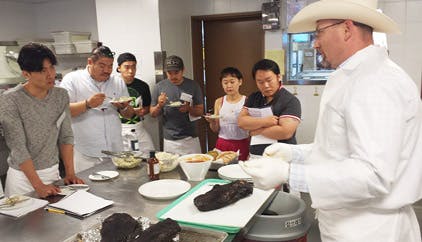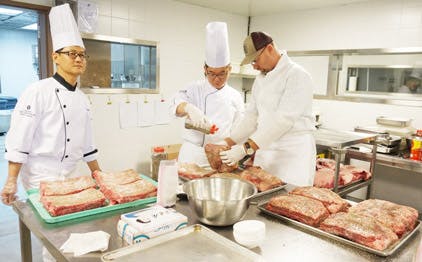Team Promotes U.S. Beef, Pork with American Barbecue Seminar in Korea

Bryan Bracewell, right, a Texas barbecue pitmaster, demonstrates methods of cooking U.S. beef and pork and provides samples of slow-cooked barbecue to Korean chefs and food bloggers
USMEF recently led a team of U.S. producers and a Texan pitmaster to South Korea to present a barbecue seminar for chefs and provide new ideas for barbecue dishes. The delegation also met with some of Korea’s most influential food bloggers to promote U.S. beef and pork by sharing detailed information on U.S. agriculture and meat production. Funding support was provided by the Beef Checkoff Program and the Pork Checkoff.
The blogger event and barbecue seminar were held back-to-back at the Grand Intercontinental Hotel in Seoul. The first session featured a presentation by Oklahoma beef producer Ruth Coffey that focused on ranching and animal care practices, while the second featured a demonstration of Texas-style barbecue by Bryan Bracewell, a renowned pitmaster from Austin, Texas.
Positioning barbecue at the center of a promotion for U.S. red meat is not unusual, given Korea’s growing affinity for the dish, noted USMEF-Korea Director Jihae Yang.
“American barbecue is one of the new food trends gaining traction in the Korean foodservice sector,” explained Yang. “The concept and taste have many strong points that appeal to Korean customers. American barbecue has tremendous potential for further growth.”

Korean chefs get lessons in seasoning U.S. red meat for different methods of barbecue preparation
To add a personal touch to the event, Coffey talked about her family’s cattle operation and showed Korean food bloggers photos of her ranch near Springer, Oklahoma. The bloggers were impressed by the family’s five-generation history in the cattle business and the amount of land cattle have for grazing. Coffey and Bracewell were joined in Korea by Texas Beef Council members Ryan Moorhouse and Bryan Forester, Idaho Beef Council member Cevin Jones and Missouri corn producer Greg Schneider.
“Many bloggers commented that it was impressive to meet with American farmers and ranchers,” said Min Park, USMEF-Korea senior manager for public relations. “To actually meet someone who grows beef or pork in the U.S. is a very big deal for them.”
Bracewell offered Korean bloggers and chefs a glimpse at the history and tradition of American barbecue, along with insights on proper cooking temperature and technique. His demonstration utilized U.S. beef short ribs and brisket, and U.S. pork Boston butt and baby back ribs.

Ruth Coffey, an Oklahoma beef producer, presents details of her ranch to Korean bloggers and chefs
“The chefs were excited to learn about low and slow cooking methods using smoking and indirect heat,” said Greg Hanes, USMEF assistant vice president for international marketing, who joined the team in Korea. “They thought it was fascinating that this cooking method can transform many different cuts into very tender and flavorful meat.”
U.S. beef and pork received a bonus promotion when the Grand Intercontinental Hotel decided to put the meat from the barbecue seminar on its buffet.
Meanwhile, as the number of American-style barbecue restaurants in Korea continues to increase, providing chefs with training is a wise plan, said Park.
“Many Korean consumers misunderstand the term barbecue, thinking that it means direct meat grilling with charcoal,” Park added. “So this was a good chance to let consumers know what real barbecue is and to position U.S. beef and pork as the main ingredients.”
To continue the education of Korean chefs, Bracewell’s barbecue cooking instructions and recipes for rub and barbecue salads, along with the USMEF Barbecue Training Camp Manual translated into Korean, were provided to those attending the seminar.
U.S. pork and beef exports achieved excellent growth in the Korean market in the first half of 2015. Pork exports increased 40 percent in volume (108,198 metric tons) and 35 percent in value ($318.2 million) compared to the same period last year. Beef exports totaled 61,190 metric tons (up 8 percent) valued at $423.7 million (up 12 percent).
Totals include both muscle cuts and variety meat
